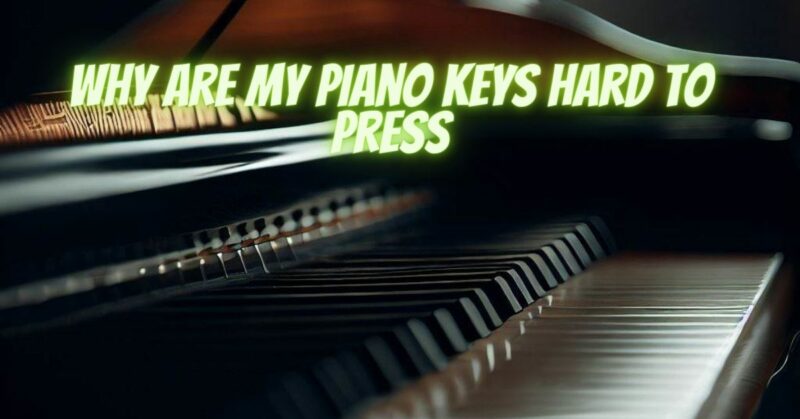Smooth and responsive key action is vital for pianists to express themselves freely and effortlessly. However, encountering piano keys that are hard to press can be frustrating and hinder your playing experience. Understanding the underlying causes of this issue can help you identify and address the problem effectively. In this article, we will explore common reasons why piano keys can become hard to press and discuss potential solutions to restore their playability.
- Accumulated Dirt and Debris:
Over time, dirt, dust, and debris can accumulate between the keys and their respective keybeds. This buildup can lead to increased friction, making the keys harder to press.
Solution: Regular Cleaning
Regular cleaning is essential to prevent dirt accumulation. Use a soft, lint-free cloth or a specialized piano key cleaner to gently wipe the tops and sides of each key. Pay close attention to the areas where the keys meet the keybeds. Cleaning between the keys with a soft brush or a vacuum cleaner with a brush attachment can also help remove trapped debris.
- Dryness and Lack of Lubrication:
Insufficient lubrication between the key surfaces and the keybed can cause increased friction and result in keys that are harder to press smoothly.
Solution: Key Lubrication
Apply a small amount of key lubricant, such as powdered graphite or a silicone-based lubricant, to the key surfaces. Be cautious not to apply excessive lubricant, as it can lead to a sticky or gummy feel. Follow the manufacturer’s instructions or consult a professional piano technician for guidance on proper lubrication techniques.
- Warped or Misaligned Key Components:
Warped or misaligned key components, such as keyslips, key frames, or balance pins, can impede the movement of the keys, making them harder to press.
Solution: Professional Adjustment
Consult a qualified piano technician to assess the condition of the key components. They can make necessary adjustments or repairs to ensure proper alignment and smooth key movement.
- Tightened Regulation Screws:
Regulation screws, which control the touch and responsiveness of the keys, may become overly tightened over time. This can result in increased resistance when pressing the keys.
Solution: Regulation Adjustment
Regulation adjustment is best performed by a professional piano technician. They can assess the regulation screws and make necessary adjustments to achieve the desired touch and responsiveness.
- Mechanical Issues:
In some cases, hard-to-press keys may be caused by mechanical issues within the piano’s action mechanism. This can include worn or damaged action parts, broken springs, or issues with the key bushings.
Solution: Professional Repair
If mechanical issues are suspected, it is advisable to consult a professional piano technician. They have the expertise to diagnose and address complex mechanical problems, ensuring the proper functioning of the keys.
Conclusion:
Encountering piano keys that are hard to press can be a frustrating experience, but understanding the potential causes can help you find appropriate solutions. Regular cleaning, proper lubrication, addressing warped or misaligned key components, regulation adjustments, and seeking professional repairs for mechanical issues are all crucial steps to restore smooth and responsive key action. By addressing these issues, you can enjoy playing your piano with ease and fully express yourself through the instrument’s beautiful sound.

